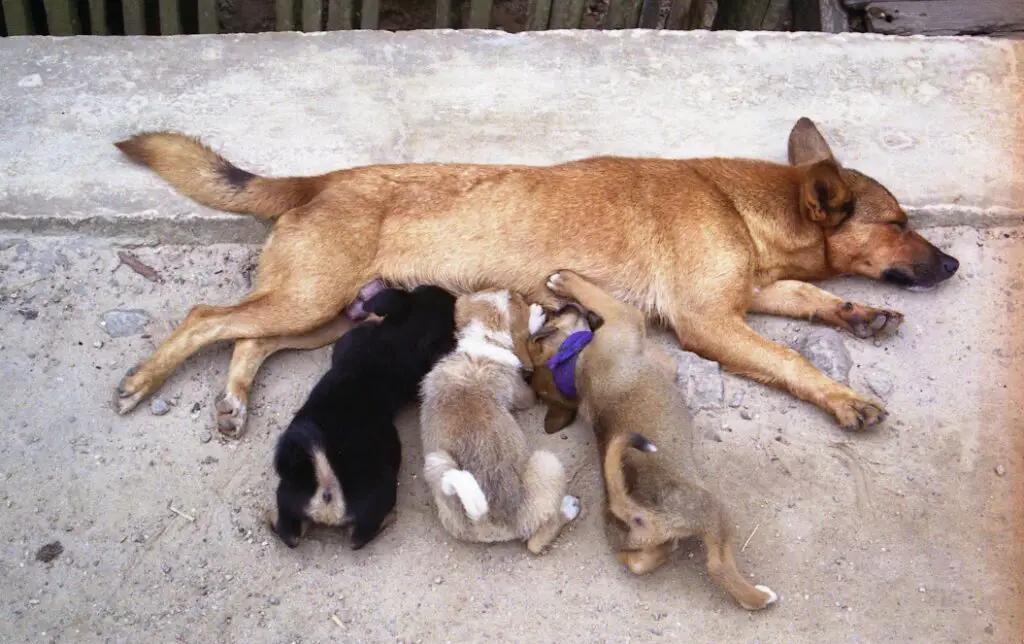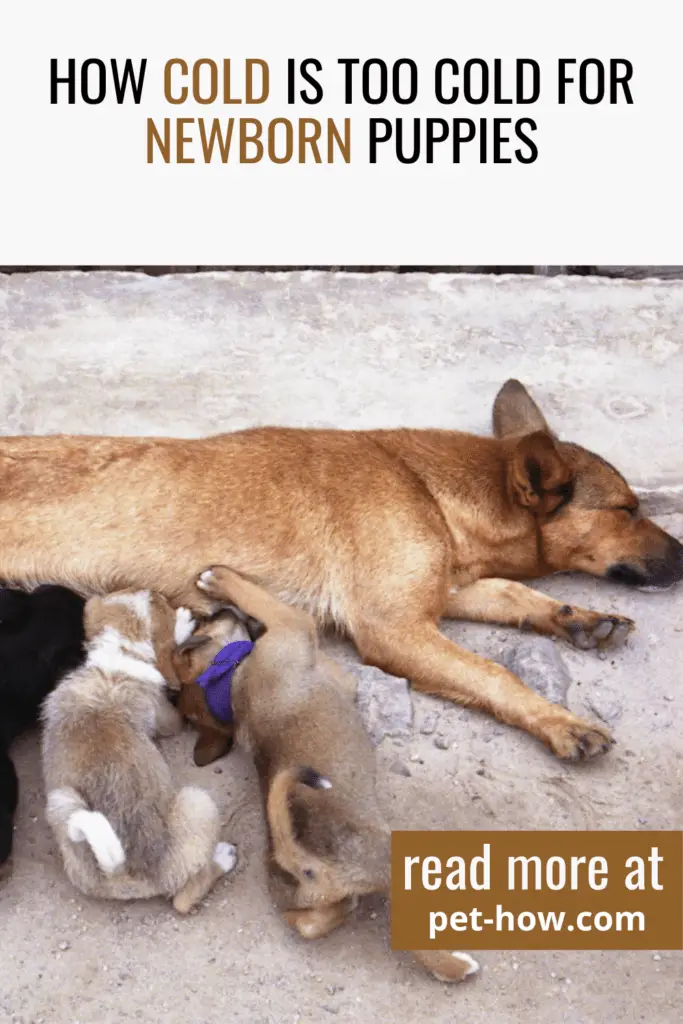Newborn puppies are unable to regulate their body temperature.
They heavily rely on their mother and the environment to keep them warm.
However, sometimes the mother is unable to keep all of the puppies warm.
So, a pet parent should step in and make sure that the area is warm enough.
If you wish to learn how cold is too cold for newborn puppies, read on.
How Cold Is Too Cold For Newborn Puppies

Temperatures below 68 degrees Fahrenheit (20 degrees Celsius) are too cold for newborn puppies and they can easily get sick. Newborn puppies are especially susceptible to the cold due to their small size, sparse fur coats, and immature immune systems. They should always be kept warm and comfortable.
For this reason, it is important to ensure that the temperature in their environment never gets below 68-72°F (20-22°C). If the temperature drops significantly lower than this, newborn puppies may become hypothermic and require immediate medical attention.
Additionally, if temperatures drop too low for extended periods of time, newborn puppies can develop respiratory issues or even die from exposure.
Therefore, it is essential to monitor the temperature closely when caring for young puppies. Take steps to warm them up if needed.
Additionally, be sure to check on them often so that any potential health issues can be addressed quickly. With proper care and attention, newborn puppies can thrive in a warm and safe environment.
(See also: Why Is Milk Coming Out Of Puppy’s Nose When Nursing? (Answered!)
How Cold Is Too Cold For Newborn Puppies
Do Puppies Feel Cold Easily?
Yes, puppies get cold easily. Puppies rely on their mothers to regulate their body temperature and stay warm during the first few weeks of life. Puppies are unable to thermoregulate or self-regulate their body temperatures until they are at least three weeks old.
The mother’s body warmth helps keep her puppies warm, as does direct contact between them and her fur. Additionally, when it is cold outside, the mother will sleep huddled up with her puppies in order to protect them from the cold.
The mother’s breathing also creates a warmer microclimate for her puppies and helps them maintain an optimal body temperature.
After about three weeks of age, a puppy may begin to thermoregulate independently by using its own fur and adjusting its body position in order to keep warm.
Puppies, like all animals, can feel cold if they are exposed to extreme temperatures. However, puppies tend to be more prone to feeling cold than adults due to their small size and lack of insulation.
Their fur coat also does not provide as much warmth as an adult’s because it is often thinner and less dense. Therefore, if your puppy gets too chilly, you should take steps to keep them warm and comfortable.
Some easy ways to do this include providing a cozy blanket or bed for them in a draft-free area, keeping their living space heated during the colder months, and making sure that they don’t spend prolonged amounts of time outdoors when it’s particularly cold outside.
(See also: How Often Should Newborn Puppies Nurse?)
How Do You Know If a Newborn Puppy Is Too Cold?
- Cold to the Touch: If your puppy’s body feels cold, it may be a sign that he is too cold. Gently lay the back of your hand on his body and see how warm or cold his skin temperature is – if it feels cool to you, then he may be chilled.
- Shivering: Like humans, puppies will shiver when they are cold as a way to conserve heat and keep their bodies warm. If your puppy is shivering frequently and for an extended period of time, consider bundling him up in a warm blanket or coat until his body temperature returns to normal.
- Huddling in Groups: Puppies seek out warmth by huddling together with their littermates or with a human. If you find your puppy huddling in groups, it may be a sign he is too cold and needs to be kept warm.
- Sleepiness: Being too cold can sap puppies of energy and cause them to become sleepy and lethargic more quickly than usual. If your puppy seems exhausted after only a few minutes of playtime, consider checking his body temperature to make sure he’s not feeling chilled.
- Pale Mucous Membranes: To check if your puppy is too cold, take a quick look at the color of his mucous membranes (gums, lips, inner eyelids). Normal mucous membranes should appear pink or coral – if they appear pale or grey, it could be a sign he is too cold.
- Cold Noses: A cool nose can also indicate that your puppy is too cold. If his nose is icy to the touch, dress him up in extra warm clothing and take him to a warmer spot – such as next to a heater or near an open fire – until his body temperature rises back to normal.
- Unresponsive Behavior: As puppies become chilled, their behavior may change – for example, a usually active pup may become unresponsive and listless due to being too cold. Be sure to monitor your puppy’s behavior and check his body temperature frequently during colder weather.
So, How Cold Is Too Cold For Newborn Puppies
How Do You Keep Newborn Puppies Warm In The Winter?
- Use a heating pad: A heating pad is one of the best ways to keep newborn puppies warm in the winter. Place the heating pad on a low setting (not too hot) and wrap it with blankets or towels to provide extra warmth.
- Get a Heat Lamp: If you don’t have access to a heating pad, try using an infrared heat lamp instead. This will provide direct heat and warm up the entire space where the puppies are staying. Just make sure that no parts of the lamp can come into contact with your puppies, as they could burn them.
- Gather Puppies Together: Newborn puppies tend to huddle together for warmth, so gathering them up close together is a great way to keep them safe and warm in the winter.
- Use Blankets or Towels: If you don’t have access to a heating pad or heat lamp, use several layers of blankets or towels to make sure your puppies stay warm. Make sure to change out the blankets/towels often so they don’t become damp with sweat from the puppy’s body.
- Provide Warm Water Bottles: Placing warm water bottles next to the puppies (and changing them regularly) can help keep newborn puppies warm in cold weather. Be careful not to burn any of your pups though – if it’s too hot for your hand, it’s too hot for their delicate skin.
- Feed Your Puppies: Make sure you feed your puppies regularly since their small bodies need the calories to stay warm. Offer them a few meals per day and make sure they are gaining weight.
- Provide Adequate Shelter: If you keep your puppies in an outdoor space, make sure they have enough shelter from the wind and rain. Raised structures, such as an elevated doghouse, can provide extra protection against cold weather and drafts.
- Monitor Temperature Regularly: Even when taking all of these precautions, it’s important to monitor the temperature of the environment where your puppies are staying on a regular basis. If you notice that it is too cold for your pups, take steps to make it warmer.
(See also: How Long Can Newborn Puppies Go Without Nursing?)
Will Newborn Puppies Cry If Too Cold?
Newborn puppies can become very cold if they’re not kept at a warm enough temperature. If the ambient temperature is too low, they may start to shiver and cry in an effort to keep warm.
It’s important that newborn puppies be kept in an environment between 80-85 degrees Fahrenheit (27-29 Celsius).
You can use a heating pad or lamp as supplemental heat for newborn puppies. The area should also be draft-free with plenty of clean bedding for the litter.
It’s also important to monitor the ambient room temperature regularly to ensure the puppies are not getting too cold.
If the puppies seem lethargic, shake uncontrollably, or have a reduced appetite, this could indicate they are too cold and need additional warmth immediately.
Taking proper care of newborn puppies is essential to ensure they stay healthy and grow up strong.
Providing a warm, safe environment for them will help keep them happy and comfortable.
What Is The Most Critical Time For Newborn Puppies?
The most critical time for newborn puppies is within the first two weeks after they are born. During this period, they need to be fed frequently, kept warm, and monitored closely by their mother or a veterinarian.
During these early weeks, it is important to provide them with adequate nutrition and prevent any potential health issues that may arise during this vulnerable period of development.
Here is a timeline of what happens in the first weeks of newborn puppies lives:
- Birth: Puppies are born without the ability to stand, open their eyes, or regulate their own body temperature. During this time, they are completely dependent on their mother for warmth and nourishment.
- First Weeks: In the first two weeks of life, puppies grow rapidly and need frequent feedings from their mother’s milk as well as her affectionate care. They will also begin to develop sight and hearing capabilities during this period.
- Third Week: By week three, puppies should be able to start walking and moving around more freely on their own while still relying heavily on their mom for sustenance. This is a critical time for newborn puppies in terms of socialization; it’s important that they receive positive interaction with humans and other animals during this period.
- Fourth Week: During their fourth week of life, puppies will begin to regulate their own body temperatures and start playing with each other as well as exploring the world around them. This is an important time for puppies to learn how to interact with their environment and begin developing puppy-like behaviors like barking or digging.
- Sixth Week: By week six, puppies are usually ready to go home with their new owners. Although they still may require additional vaccinations and training, this is a crucial time for new puppy owners to take responsibility for socializing their pup properly so that it can grow into a healthy, happy, and well-behaved adult dog.
Exactly How Cold Is Too Cold For Newborn Puppies
Can Newborn Puppies Stay Outside?
No, it is not recommended to leave newborn puppies outside. Newborn puppies are extremely fragile and require close monitoring and care from a responsible adult.
They cannot regulate their body temperature on their own, so they need to be in a warm and protected environment.
Additionally, they still depend on their mother for nourishment and other care needs such as the elimination of waste.
If left alone outdoors without supervision, newborn puppies are also more vulnerable to predators and risk injury or death from extreme weather conditions.
At the absolute minimum, newborn puppies should be supervised when outside for brief periods of time with adequate protection from the elements.
When taking them outdoors in cold temperatures, make sure that you have some form of portable heat source available like a heating pad or warm water bottle.
Make sure to also provide plenty of soft bedding that is not exposed to drafts, while also keeping the area free from any dangerous objects and substances.
(Related: How To Care For a Newborn Litter of Puppies [Complete Guide]
In Conclusion
Keeping a newborn puppy warm is essential.
Make sure that the area where the mother is laying down is warm to around 70 degrees Fahrenheit.
Always check on the puppies and look for any signs of a cold.
If the puppy is cold, place a heat mat or increase the room temperature.






Leave a Reply